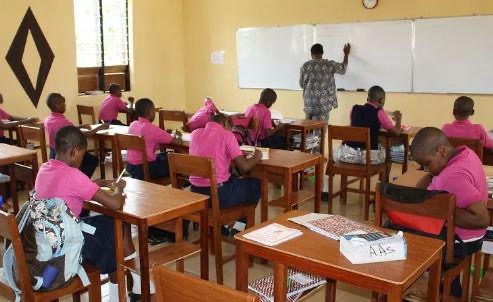
The Federal Government of Nigeria has embarked on a bold and transformative reform of the nation’s education system, announcing the abolition of Junior Secondary School (JSS) and Senior Secondary School (SSS) as separate entities and replacing them with a comprehensive 12-year uninterrupted basic education model. Under this new structure, every Nigerian child will be entitled to continuous education from primary school up to the age of 16, after which they can transition into higher education, vocational training, or other career pathways.
This reform marks a decisive departure from the decades-old 6-3-3-4 education system, which segmented schooling into primary education (six years), junior secondary (three years), senior secondary (three years), and tertiary education (four years). The new structure, labeled as the 12-4 model, seeks to eliminate systemic bottlenecks, harmonize learning, and ensure that students acquire foundational knowledge before moving into specialized fields.
 The announcement was made in Abuja by the Minister of Education, Dr. Tunji Alausa, during the 2025 extraordinary National Council on Education (NCE) meeting. The council, which serves as the apex decision-making body in Nigeria’s education sector, convened key stakeholders, including education commissioners from all 36 states and the Federal Capital Territory, representatives from agencies and parastatals under the Federal Ministry of Education, as well as development partners invested in Nigeria’s educational progress.
The announcement was made in Abuja by the Minister of Education, Dr. Tunji Alausa, during the 2025 extraordinary National Council on Education (NCE) meeting. The council, which serves as the apex decision-making body in Nigeria’s education sector, convened key stakeholders, including education commissioners from all 36 states and the Federal Capital Territory, representatives from agencies and parastatals under the Federal Ministry of Education, as well as development partners invested in Nigeria’s educational progress.
Speaking at the event, Dr. Alausa stressed that the reform is not just an administrative change but a fundamental shift designed to enhance the quality, accessibility, and inclusivity of education in Nigeria. He highlighted the fact that many developed nations have long adopted similar education structures, ensuring students receive a well-rounded and uninterrupted foundational education before venturing into higher education or the workforce.
One of the primary motivations behind this overhaul is to curb the country’s alarmingly high dropout rates, particularly between junior and senior secondary school. Currently, financial constraints, systemic inefficiencies, and socio-economic factors force many Nigerian children to abandon their education before completing secondary school. By integrating these levels into a single 12-year compulsory education system, the government aims to eliminate such barriers, ensuring that students remain in school until they are at least 16 years old.
“Extending basic education to 12 years will ensure a standardized curriculum that is uniformly implemented across the country,” Alausa stated. “It will also expose students to vocational and entrepreneurial skills at an early stage, equipping them for either higher education or immediate entry into the workforce.”
Globally, many advanced nations have long embraced a system where basic education spans 12 years before students proceed to higher institutions or vocational pathways. Countries like the United States, Canada, Germany, and the United Kingdom follow a structured 12-year schooling model that ensures students are academically and developmentally prepared before making career choices. Nigeria’s new policy seeks to align with these global standards, providing its students with an education that is competitive on the international stage.
Beyond academic preparation, the new policy is expected to introduce students to vocational and technical training earlier in their education. This shift is particularly crucial for Nigeria, where unemployment remains a pressing challenge. By equipping students with practical skills while they are still in school, the government hopes to create a more self-sufficient and employable workforce.
In another significant policy shift, the government is seeking the official approval of the National Council on Education to set 16 years as the minimum age for entry into Nigeria’s tertiary institutions. This proposal, if fully adopted, will standardize the academic timeline for students and ensure that only those who have reached an appropriate level of maturity and preparedness advance to higher education.
This move is in response to growing concerns about the readiness of younger students who enter universities before they are developmentally equipped to handle the challenges of tertiary education. Many Nigerian students currently gain admission into universities at ages as young as 14 or 15, often struggling with the academic, social, and emotional demands of higher education. The proposed age limit aligns with global practices and seeks to produce more mature, well-rounded graduates.
While the policy presents an ambitious vision for the future of education in Nigeria, its implementation will not be without challenges. Infrastructure, teacher training, and curriculum development must be overhauled to accommodate the new system. Schools will need to be equipped with adequate classrooms, laboratories, and teaching resources to sustain a 12-year uninterrupted education framework.
 Furthermore, teachers will require retraining to adapt to the demands of the new curriculum. The government must also address concerns about funding, as extending compulsory education means an increased financial commitment to providing free and accessible learning for all students up to age 16.
Furthermore, teachers will require retraining to adapt to the demands of the new curriculum. The government must also address concerns about funding, as extending compulsory education means an increased financial commitment to providing free and accessible learning for all students up to age 16.
To ensure a smooth transition, education authorities are expected to roll out a phased implementation plan, gradually integrating the new structure while addressing potential gaps in policy execution. Public awareness campaigns and stakeholder engagements will also be necessary to secure buy-in from parents, educators, and communities.
Despite the hurdles, this reform represents a bold step towards reshaping Nigeria’s education sector. By eliminating segmentation in secondary education and ensuring continuous learning for all students, the government aims to create a more robust, inclusive, and globally competitive education system.
For millions of Nigerian children, this policy could be the key to unlocking greater opportunities, equipping them with the knowledge, skills, and confidence to excel in a rapidly evolving world. As the nation awaits the final approval and rollout of the new structure, all eyes will be on how effectively the government navigates the challenges of implementation to bring about a true educational revolution.
By : Jide Adesina

